
There are a number of reported Courts Martial on this page
Lt Col A E Mainwaring, 2nd Battalion. 1914 August. Court Martial for surrender in the face of the enemy -
The famous court martial is that of Lt Col A E Mainwaring, commanding the 2nd battalion Royal Dublin Fusiliers in August 1914
Lt Col AE Mainwaring, along with the CO of 1st R Warwicks, Lt Col Elkington, signed a document of surrender at St Quentin on 27th August 1914 during the retreat from Mons, in order to spare the town. The situation was saved by Major Tom Bridges, 4th Dragoon Guards, who managed to assemble the men and march them out. The two COs were court-martialed and cashiered. Elkington joined the Foreign Legion and was later reinstated, Mainwaring disappeared from history and died in 1930.
They were court-martialed. Despite being found guilty of surrender in the face of the army - Mainwaring was cleared of cowardice. Instead, he was convicted of the lesser charge of scandalous conduct. Cashiered out of the army in disgrace, he was however allowed to quietly rebuild his life.
The 1st Royal Warwickshire Regiment commanded by Lieutenant-Colonel Elkington and the 2nd Royal Dublin Fusiliers under Lieutenant- Colonel Mainwaring - had reached the main square in St. Quentin on the 27th August, among the last British troops to arrive in the city. With officers and men totally exhausted, the two colonels, one of whom was certainly sick, had been persuaded by the Mayor to give a written undertaking not to endanger the city’s inhabitants by putting up a resistance against the entry of the Germans which was expected within the next few hours.
The British infantry took up defensive positions along the Mons canal. But they were hopelessly outnumbered and ill-equipped: 70,000 troops as opposed to 160,000 and 300 heavy guns against 600 German. Within days the British had suffered almost 10,000 casualties and were in 'strategic retreat' - throwing away their weapons as they ran. On August 27, the remnants of the Dublin Fusiliers arrived in the dusty little French railway town of St Quentin, where there were no trains to take his men away from the advancing enemy. The surviving soldiers flatly refused to march another step.
Nothing in the long and distinguished military career of their 50-year-old commanding officer had prepared him for the horror of the retreat from Mons - or the fate that awaited him and his troops in St Quentin. Had he been made of sterner stuff he would have threatened them with the firing squad. Maybe even executed a few then and there for refusing to obey his orders. Instead Lt Col Mainwaring and the commanding officer of the First Royal Warwicks, Lt Col John Elkington, gave in to the entreaties of the local mayor and signed a piece of paper agreeing to surrender rather than see the citizens massacred in a German artillery bombardment.
He had been negotiating with the mayor for food and transport for his men, when panic broke out as a messenger claimed the town was surrounded by Germans. He and Elkington agreed that they could not endanger the safety of the townspeople and tried to get their men up on their feet to march on. 'The fact is that the men could do no more for the time being, Their limit of endurance was reached. I considered it my duty to protect these men, who so nobly had done theirs. I still consider that it was so, and my conscience is quite clear,' Mainwaring wrote. The thick-set and normally implacable Mainwaring himself, an eyewitness later wrote, 'looked very pale, entirely exhausted and leaned heavily on his stick'. And so he signed the document that was to bring about his disgrace.
At this point a troop of the Royal Irish Dragoon Guards came on the scene. One of them, Major Tom Bridges. Bridges recalled later: 'The men in the square were so jaded it was pathetic to see them. If one only had a band, I thought! Why not? 'There was a toy shop handy, which provided my trumpeter and myself with a tin whistle and a drum, and we marched round the fountain, where the men were lying like the dead, playing the British Grenadiers and Tipperary, and beating the drum like mad. They sat up and began to laugh and cheer. I stopped playing and made them a short exhortation and told them I was going to take them back to their regiments. 'Late that evening 400 men marched out of the town. By now Elkington was nowhere to be seen, but armed with a walking stick, Mainwaring marched wearily alongside Major Bridges at the head of the column. By 2 a.m. on the 28th August, as a patrol of Uhlans was about to enter St. Quentin the line of marching men was well clear of the city.
The cavalry officers had insisted that the mayor hand over his surrender letter to them and that could only mean a court martial. No official record of the hearing survives but one officer in the dragoons claimed that a firing squad was already drawn up when the court decided the two officers had suffered a mental breakdown, under stress, and dismissed the charge of cowardice. At the court martial, Elkington, who was the more senior of the two, would deny authorising the surrender. Both Elkington and Mainwaring were dismissed from the army in disgrace.
After the court martial Mainwaring wrote a lengthy justification of his actions. It described how he and Elkington, who had the future Field Marshal Viscount Montgomery among his junior officers, had marched in to face their first action on August 24, with the army already in retreat. As they dug in, next day, to cover their colleagues' backs, they come under heavy shellfire. They were last to retreat, under cover of darkness, and without rations went through the same ordeal the next day. In the midst of the battle Mainwaring received the last order he would get from High Command: 'The general says he wishes you to hold on here to the end. This is a personal message from him to the regiment'. By early evening everyone else had pulled out and Mainwaring wrote: 'The behaviour of our men had been splendid throughout. They were so dog tired that many of them slept through the infernal fire, as one could here them snoring. 'It was then he discovered that HQ had been abandoned and he determined on another night march in retreat, hoping to catch up with them. He allowed his men to grab a couple of hours sleep in a barn but dared not nod off himself because there was no one to wake him.
Elkington, two years younger than Mainwaring, was to redeem himself a year later, fighting at Navarin Farm, Vimy Ridge for the French Foreign Legion, knocking out enemy machine gun posts until his leg was shattered by gunfire and he lay in a trench, close to death, for 13 hours. He was awarded the Croix de Guerre and in 1916 King George V reinstated him to his old rank in the Warwickshires.
Mainwaring still very sick, and despite pleas for similar treatment was not to resume his army career.
Capt E J Hamilton court martialed for misconduct April 1917

![]()
London Gazette of 16 May 1917 reported Temp. Capt E J Hamilton to be dismissed the service by authority of a General Court Martial (24 April). Also reported in War Diary of 10th Battalion. The 10th battalion had been in the front for over a week at this point and had just been relieved to support trenches. There had been two difficult and abortive attacks on the village of Gavrelle plus heavy shelling of the front trenches over the period. In fact Capt Hamilton's court-martial was in Dublin, and he was commanding a guard unit in Dublin
Ernest James Hamilton, was born Portrush, Antrim, son of H M Hamilton from Ballywilliam near Portrush in County Antrim. He was educated at Coleraine Academical Institution, and then went tp TCD as a medical student. He enlisted into the ranks of the 7th Royal Dublin Fusiliers, and made L/Cpl Sept 1914, Cpl in Oct 1914. He was commissioned as 2nd Lt in Dec 1914. He took part in the landing at Suvla Bay and on 16 August was promoted to Captain when having to take command of his company when all his fellow officers became casualties. By the time that D Coy, 7th RDF attacked the Pimple, only one officer was left, Lt Hamilton, badly wounded in the foot. He is noted as being in hospital on account of his wound on 17 Aug 1915. He left his unit seriously ill from dysentery and injured on 20 August 1915. He later served in France with 10th Battalion and is recorded as in command of C Company when they arrived in France in Aug 1916. I have not been able to find any other references to him in 10th Battalion war diary, which is odd in that the war diary usually recorded if an officer left the battalion, which he must have done as he was on service in Dublin in March 1917.
Late on the night of 22-23 March 1917 he was in command of the Headquarters Guard, Irish Command in Dublin. A General Court Martial held in Dublin on 2 April 1917 found Ernest guilty of misconduct and sentenced him to be dismissed from the service. Royal Hospital, Kilmainham, is on Bow Lane Dublin. It became outdated as a hospital and in 1913 patients were transferred to George V Hospital. The British Army Headquarters, Irish Command, then occupied the premises.
CQMS Flood, 5th Battalion. 1916 June, Court Martial for Murder
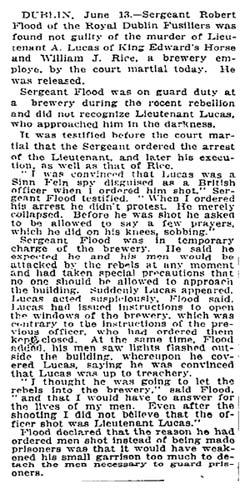
CQMS Flood of 5th Battalion was court-martialed and acquitted for murder of prisoners during the Easter Rising. Details here. Robert Flood was moved to the Royal Berkshire Regt, and was killed in May 1917. Long Service and Good Conduct Medal. Husband of Frances Daisy Flood, of "Newville," Barham, Canterbury, Kent. Enlisted Royal Dublin Fusiliers, 1899. Born in London.
18994 Sgt Joseph Brady court-martialed for allowing a prisoner to escape in Nov 1916
Joseph Brady was born in Naas County Kildare in 1887. Before joining the army he was a professional billiard player and was in charge of billiard rooms in Dublin. He enlisted in the 7th Battalion D Coy ''Pals'' Battalion of the Dub's as a private in 1915 and after his training he went Suva Bay, Gallipoli, with his battalion. He wrote varios pieces for the Blackthorn battalion magazine on billiards. In Gallipoli he worked as a stretcher-bearer and was promoted to Lance Corporal on the 14th August 1915. He contracted enteric fever on the 20th August 1915 and was invalided back to Ireland,when he recovered he was attached to the 10th battalion as a Corporal. When the 10th Battalion were moved to France in August 1916 he was transferred to the 11th Battalion as a Sergeant.
It was in this position that he was charged with allowing a prisoner to escape from Wellington Barrack's Dublin on the 7th November 1916. He was court martialed a week later at Portobello Barrack's. His trial was reported in the newspapers
A district court martial at Portobello Barrack's inquired this morning into the extraordinary escape of a prisoner from Wellington Barracks on November 7th,when Sergeant Joseph Brady 11th Battalion Royal Dublin Fusiliers was charged with having without reasonable excuse while in command of the regimental guard allow Private J. Shine 11th Battalion R.D.F. to escape from custody. Accused pleaded not guilty and was defended by Mr Joseph Gleeson solicitor, Lieutenant J. Keenan 11th Battalion R.D.F. prosecuted. The officers constituting the court were Major W. Price, 3rd City of London Yeomanry, President Captain Millar 1st Battalion R.D.F. and Captain Coddington R.I.R.
Regimental Sergeant-Major Ryan 11th Battalion R.D.F. stated that about 9.30 on the morning of November 7th Sergeant Brady, who was commanding the outer guard of Wellington Barracks, reported to him that Private Shine, who was a court martial prisoner, had escaped from his guard and placed under arrest. Cross-examined by Mr Gleeson the RSM stated During my dealings with Sergeant Brady I found him very steady, sober, reliable and a thoroughly efficient N.C.O. I do not consider that Sergeant Brady would allow a prisoner to escape without a reasonable excuse.
Sergeant Doyle 11th Battalion R.D.F. heard the accused report the escape of the prisoner to Sergeant Mayor Ryan. In cross-examination by Mr Gleeson Sgt Doyle said the stove which heats the detention room was out of order on the occasion in question and as a result men under detention were allowed to go to the guardroom to warm themselves on a cold day, but that morning there was a whole guard in the guardroom and a sentry outside the door. He believed there was no possibility of this man escaping unless something extraordinary occurred?
Private W. McVey 11th Battalion R.D.F. said he was sitting in the guardroom on the morning in question, reading a newspaper and saw Shine sweeping round the fireplace, but did not see him leave the room. Sergeant Brady came in from the back yard of the guardroom and asked witness if he had see Private Shine, or had any of the regimental police come for him. Witness replied ''No'' Sergeant Brady then searched for Shine, but could not find him. He had noticed Sergeant Brady earlier leaving the guardroom very quickly, as if he had become suddenly ill. Questioned by the court, the witness said six men; a corporal and a sergeant were on guard. Two were on sentry, one was washing himself in the yard, the witness was reading and another was cleaning his rifle.
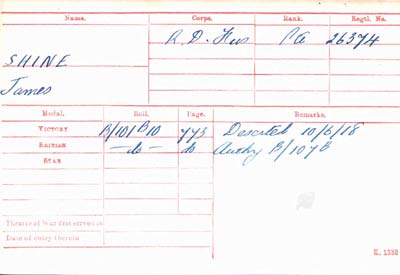
He was in the Guardhouse on 7th November 1916 when he escaped. Shine's Medal card shows him deserting 10 June 1918.
The accused gave evidence on his own behalf. In reply to Mr Gleeson, he said that before he joined the army he was a professional billiard player. Shortly after the outbreak of war he sacrificed his earnings amounting to about £500 a year to join the army. He joined the 7th Battalion of the Royal Dublin Fusiliers and served in Gallipoli. Invalided home he became attached to the 10th Battalion R.D.F. and when the latter left Dublin he was transferred to the 11th Battalion with which he is now serving. On the 7th November he was commander of the outer guard at Wellington Barracks and had in his custody three prisoners in the guard detention room, one of whom was Private Shine. Becoming ill, he had to leave the guardroom suddenly, three of the guards remaining behind. Shine at the moment asked to get out to the yard for a wash and a witness let him out of the detention room. The witness saw one of the guard in the yard at the time and passed some remark or him ''to look after Shine'' though being in pain he could not remember what he said. He said he had been out of the guardroom "about two minutes"
Lieutenant Keenan the prosecutor, was then called by Mr. Gleeson to give evidence as regard the character of accused. The witness said he acted as adjutant of the regiment for six months and knew accused as a trustworthy, efficient and sober N.C.O. This closed the case for the defence.
Mr Gleeson addressed the Court at length on behalf of the accused and submitted that the latter did not wilfully allow Shine to escape and that he did all he possibly could have done in the circumstance. Army law did not ordain that a man should do impossibilities and the Court must be satisfied that the accused had no reasonable excuse for allowing his prisoner to escape. If ever there was a case in which the accused had acted reasonably it was this. The accused was found not guilty.
Brady was again later transferred to the 1st Battalion was killed on the 1st March 1917 in France. He has no known grave and his name is commemorated on the Thiepval Memorial . There seems to be confusion here as his MIC shows 18994 Sgt Joseph Brady KIA on 28 Jan 1917 and entering France on 19 Dec 1915 (this is clearly incorrect as he went to Gallipoli, not France - he is also included in Pals at Suvla Bay as being in Gallipoli), whereas CWGC shows Killed 1 March , 1st Battalion, son of the late John and Bridget Brady. I am unclear which is he.
11805 Private William Dunne tried for fraud
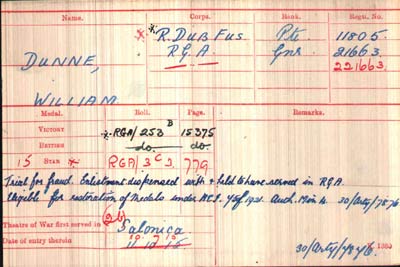 |
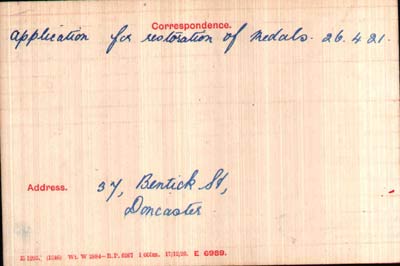 |
| Medal card gives entered Salonica 10 Jul 1915. transferred to RGA. Tried for fraud. Medals restored | |
25206 Private John Kenny - court martialed for Mutiny 18 April 1918
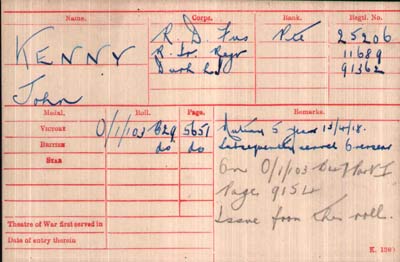
Royal Dublin Fusilier Courts Martial